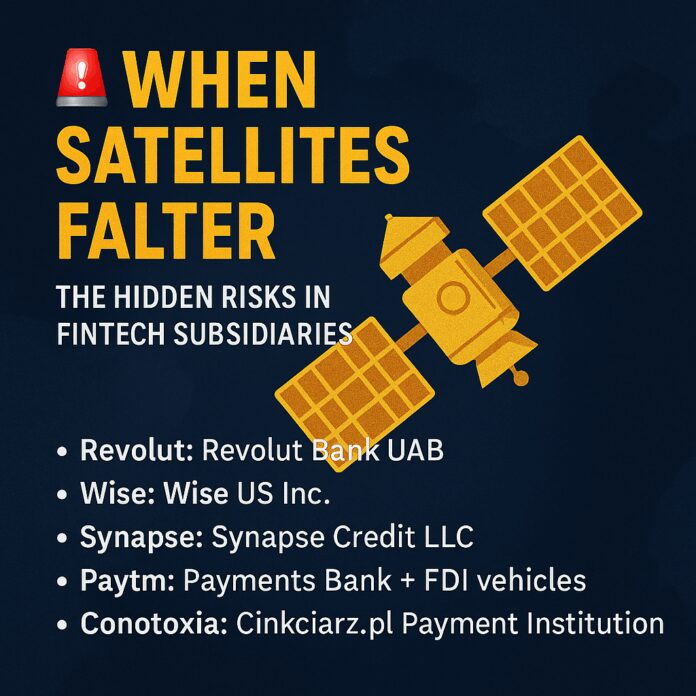From Lithuania to California, from payments to lending—some of the biggest regulatory landmines in fintech are quietly exploding far from headquarters.
As the spotlight falls on N26’s embattled Dutch mortgage venture Neo Hypotheken, the case highlights a broader and largely overlooked pattern in fintech: subsidiaries and foreign units triggering disproportionate regulatory backlash, often with minimal public attention.
These aren’t high-profile failures—but precisely because they unfold quietly, they pose an even greater threat to credibility, capital planning, and investor confidence.
The Quiet Crackdowns You Probably Missed
| Fintech (Parent) | Subsidiary / Unit | What Went Wrong |
|---|---|---|
| Revolut | Revolut Bank UAB (Lithuania) | The ECB imposed the highest Pillar-2 capital surcharge in the Eurozone (3.7 % RWA) after risk model irregularities surfaced during stress tests. Revolut’s attempts to scale cross-border lending through its Lithuanian licence may now require equity injections or balance sheet reshaping. |
| Wise PLC | Wise US Inc. | The Consumer Financial Protection Bureau (CFPB) sanctioned Wise in Jan 2025 for misleading disclosures around ATM fees and errors in cross-border remittance handling. Wise paid nearly $500,000 in redress and fines and must now adhere to a strict compliance plan—unknown to most EU investors. |
| Synapse | Synapse Credit LLC | As the parent company filed for Chapter 11 in May 2024, California regulators revoked the lending licence of its credit arm for failing to produce transaction records. Though overshadowed by the bankruptcy, the state-level ban effectively blocks any reboot under the Synapse name. |
| Paytm | Paytm Payments Bank + Singapore shell entities | Following an RBI ban on new deposits, the Enforcement Directorate accused Paytm of ₹6.1 bn in FEMA violations (foreign exchange misreporting) through linked offshore subsidiaries. The fallout disrupted remittances, lending, and investor confidence across India’s fintech sector. |
| Conotoxia (Cinkciarz.pl) | Cinkciarz.pl Payment Institution | In October 2024, Poland’s KNF revoked its domestic licence over alleged breaches in safeguarding customer funds. The company has since filed a €1.65 billion lawsuit against 11 banks and the regulator, citing “structural discrimination” in the Polish fintech sector. |
The Pattern: Subsidiaries as Soft Targets
Each case reveals a consistent risk vector:
- Different rulebooks – Subsidiaries often fall under different national frameworks (e.g. TRHK in NL vs. MaRisk in DE), which may not align with group-level compliance.
- Lower visibility – Local infractions remain off the radar of global media and sometimes even group auditors until they escalate.
- Delayed escalation – By the time regulators act—whether through licence revocation, capital add-ons, or enforcement orders—the damage is already reputational and financial.
The result: a seemingly minor compliance failure inside a foreign subsidiary can force major structural shifts across the group.
Strategic Lessons for Multi-Jurisdiction Fintechs
| Risk Factor | Proactive Mitigation |
|---|---|
| Diverging regulatory expectations | Apply group-wide internal risk models even if not locally required |
| Patchy subsidiary governance | Establish central oversight of all licensing, record-keeping, and disclosures |
| Reputational firewalls | Avoid “ring-fencing by branding” — every product line reflects on the group |
| Local enforcement surprise | Build early-warning monitoring for all units with external regulatory interfaces |
Conclusion: If the Satellite Fails, the Mothership Pays
In a post-AML, post-Basel III environment, regulators are growing less tolerant of compliance silos inside fast-scaling fintech groups. Whether it’s N26 in Amsterdam, Revolut in Vilnius, or Wise in New York, the message is the same:
Jurisdictional distance is no shield.
When a subsidiary missteps, the parent will carry the weight.
For fintech founders, the path to global expansion no longer just runs through markets—it runs through compliance integration, risk harmonisation, and cross-border accountability.




